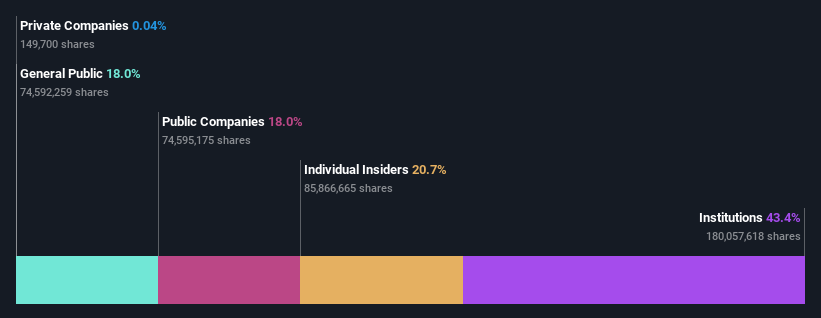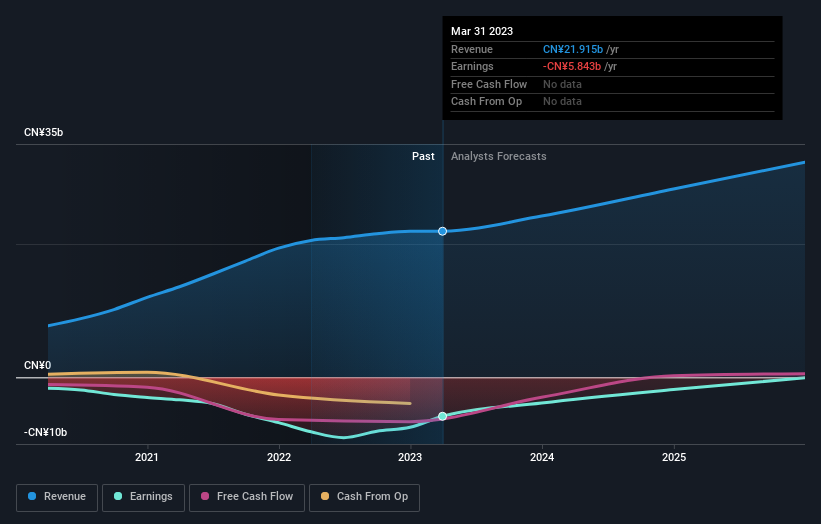After losing 24% in the past year, Bilibili Inc. (NASDAQ:BILI) institutional owners must be relieved by the recent gain
Key Insights
Given the large stake in the stock by institutions, Bilibili's stock price might be vulnerable to their trading decisions
The top 9 shareholders own 53% of the company
To get a sense of who is truly in control of Bilibili Inc. (NASDAQ:BILI), it is important to understand the ownership structure of the business. The group holding the most number of shares in the company, around 43% to be precise, is institutions. Put another way, the group faces the maximum upside potential (or downside risk).
Institutional investors would appreciate the 21% increase in share prices last week, given their one-year returns have been disappointing at 24%.
Let's delve deeper into each type of owner of Bilibili, beginning with the chart below.
Check out our latest analysis for Bilibili
What Does The Institutional Ownership Tell Us About Bilibili?
Many institutions measure their performance against an index that approximates the local market. So they usually pay more attention to companies that are included in major indices.
We can see that Bilibili does have institutional investors; and they hold a good portion of the company's stock. This suggests some credibility amongst professional investors. But we can't rely on that fact alone since institutions make bad investments sometimes, just like everyone does. When multiple institutions own a stock, there's always a risk that they are in a 'crowded trade'. When such a trade goes wrong, multiple parties may compete to sell stock fast. This risk is higher in a company without a history of growth. You can see Bilibili's historic earnings and revenue below, but keep in mind there's always more to the story.
Bilibili is not owned by hedge funds. With a 12% stake, CEO Rui Chen is the largest shareholder. With 11% and 7.4% of the shares outstanding respectively, Tencent Holdings Limited and Alibaba Group Holding Limited are the second and third largest shareholders.
We did some more digging and found that 9 of the top shareholders account for roughly 53% of the register, implying that along with larger shareholders, there are a few smaller shareholders, thereby balancing out each others interests somewhat.
While it makes sense to study institutional ownership data for a company, it also makes sense to study analyst sentiments to know which way the wind is blowing. There are plenty of analysts covering the stock, so it might be worth seeing what they are forecasting, too.
Insider Ownership Of Bilibili
The definition of company insiders can be subjective and does vary between jurisdictions. Our data reflects individual insiders, capturing board members at the very least. The company management answer to the board and the latter should represent the interests of shareholders. Notably, sometimes top-level managers are on the board themselves.
I generally consider insider ownership to be a good thing. However, on some occasions it makes it more difficult for other shareholders to hold the board accountable for decisions.
It seems insiders own a significant proportion of Bilibili Inc.. Insiders own US$1.6b worth of shares in the US$7.8b company. That's quite meaningful. Most would say this shows a good degree of alignment with shareholders, especially in a company of this size. You can click here to see if those insiders have been buying or selling.
General Public Ownership
The general public, who are usually individual investors, hold a 18% stake in Bilibili. This size of ownership, while considerable, may not be enough to change company policy if the decision is not in sync with other large shareholders.
Public Company Ownership
We can see that public companies hold 18% of the Bilibili shares on issue. This may be a strategic interest and the two companies may have related business interests. It could be that they have de-merged. This holding is probably worth investigating further.
Next Steps:
While it is well worth considering the different groups that own a company, there are other factors that are even more important. To that end, you should be aware of the 1 warning sign we've spotted with Bilibili .
Ultimately the future is most important. You can access this free report on analyst forecasts for the company.
NB: Figures in this article are calculated using data from the last twelve months, which refer to the 12-month period ending on the last date of the month the financial statement is dated. This may not be consistent with full year annual report figures.
Have feedback on this article? Concerned about the content? Get in touch with us directly. Alternatively, email editorial-team (at) simplywallst.com.
This article by Simply Wall St is general in nature. We provide commentary based on historical data and analyst forecasts only using an unbiased methodology and our articles are not intended to be financial advice. It does not constitute a recommendation to buy or sell any stock, and does not take account of your objectives, or your financial situation. We aim to bring you long-term focused analysis driven by fundamental data. Note that our analysis may not factor in the latest price-sensitive company announcements or qualitative material. Simply Wall St has no position in any stocks mentioned.
Join A Paid User Research Session
You’ll receive a US$30 Amazon Gift card for 1 hour of your time while helping us build better investing tools for the individual investors like yourself. Sign up here


